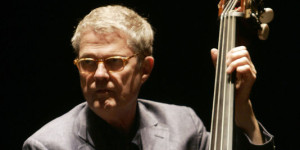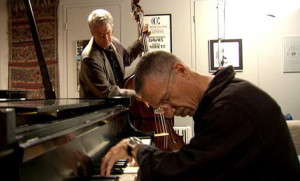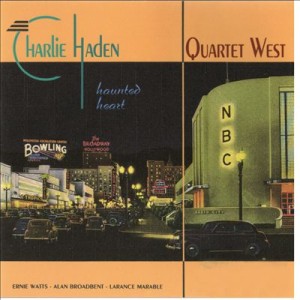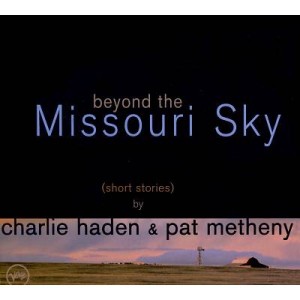 As of this Friday, Charlie Haden will have been off the planet for two weeks. Yet I’m still tripping over him in unexpected places. Earlier this week, for instance, I put on an ECM compilation of Carla Bley’s work and all of a sudden, this voice pours out of the speakers that sounded a lot like Linda Ronstadt’s from her daisy-fresh Stone Poneys days. Turned out that’s exactly who it was: Ronstadt doing lead vocals on Bley’s “Why?” from the 1971 jazz opera, Escalator Over The Hill. And who should be vocally harmonizing with her on this track, in what sounds like the bluegrass idiom of his childhood professional days, but Haden, who also played double-bass for Bley’s orchestra.
As of this Friday, Charlie Haden will have been off the planet for two weeks. Yet I’m still tripping over him in unexpected places. Earlier this week, for instance, I put on an ECM compilation of Carla Bley’s work and all of a sudden, this voice pours out of the speakers that sounded a lot like Linda Ronstadt’s from her daisy-fresh Stone Poneys days. Turned out that’s exactly who it was: Ronstadt doing lead vocals on Bley’s “Why?” from the 1971 jazz opera, Escalator Over The Hill. And who should be vocally harmonizing with her on this track, in what sounds like the bluegrass idiom of his childhood professional days, but Haden, who also played double-bass for Bley’s orchestra.  A day later, I finally caught hold of Last Dance, the recently-released ECM album with Haden and one of his old bosses, Keith Jarrett, performing classic pop standards. Though these duets were recorded in 2007, the album’s ruminative tone and sepulchral title, augmented by having “Every Time We Say Goodbye” and, then, “Goodbye” as back-to-back concluding numbers, seem to emit melancholy prophesy. Except I don’t feel in any way saddened while listening to these intimate conversations between two veterans who, though working with traditional chord progressions and stone-ground rhythms, find new ways to make these warhorses enrapture and inspire. Which may be another way of saying that nothing much has changed and Charlie Haden will somehow always be with us, letting his romanticist’s gospel of Beauty and Truth filter through the world where, through most of his 76 years, he spread this gospel broadly, but never thinly. We could be spending almost as many years wandering through and assessing his prolific contributions as sideman, leader, composer, collaborator and movie director. You read right. Movie director. And while you wont find his name listed as such on the Internet Movie Database, Charlie Haden excelled at making movies of the mind, even when he wasn’t trying. Born in 1937, Haden was a child of both motion pictures and the radio and, thus, instinctively understood how the former so robustly fed people’s imaginations, which were comparably stimulated by the latter. Just as the movies could make you want to get up and dance, orchestrated sounds could make you lie back and dream. By the 1950s, the movies would help dictate how we listen to music. (Think of all those set-the-mood-for-making-out LPs of the era with lush strings.) And Haden became one of the auteurs of concept albums that, openly or otherwise, borrowed their tropes from cinema. Most especially, what became known as the Hollywood noir movies of the forties and fifties became a recurring motif with Haden’s Quartet West albums on Verve, beginning with 1986’s eponymous album introducing the quartet – saxophonist Ernie Watts, pianist Alan Broadbent and drummer Billy Higgins, Haden’s onetime band mate with Ornette Coleman, replaced with Larance Marable on 1988’s In Angel City.
A day later, I finally caught hold of Last Dance, the recently-released ECM album with Haden and one of his old bosses, Keith Jarrett, performing classic pop standards. Though these duets were recorded in 2007, the album’s ruminative tone and sepulchral title, augmented by having “Every Time We Say Goodbye” and, then, “Goodbye” as back-to-back concluding numbers, seem to emit melancholy prophesy. Except I don’t feel in any way saddened while listening to these intimate conversations between two veterans who, though working with traditional chord progressions and stone-ground rhythms, find new ways to make these warhorses enrapture and inspire. Which may be another way of saying that nothing much has changed and Charlie Haden will somehow always be with us, letting his romanticist’s gospel of Beauty and Truth filter through the world where, through most of his 76 years, he spread this gospel broadly, but never thinly. We could be spending almost as many years wandering through and assessing his prolific contributions as sideman, leader, composer, collaborator and movie director. You read right. Movie director. And while you wont find his name listed as such on the Internet Movie Database, Charlie Haden excelled at making movies of the mind, even when he wasn’t trying. Born in 1937, Haden was a child of both motion pictures and the radio and, thus, instinctively understood how the former so robustly fed people’s imaginations, which were comparably stimulated by the latter. Just as the movies could make you want to get up and dance, orchestrated sounds could make you lie back and dream. By the 1950s, the movies would help dictate how we listen to music. (Think of all those set-the-mood-for-making-out LPs of the era with lush strings.) And Haden became one of the auteurs of concept albums that, openly or otherwise, borrowed their tropes from cinema. Most especially, what became known as the Hollywood noir movies of the forties and fifties became a recurring motif with Haden’s Quartet West albums on Verve, beginning with 1986’s eponymous album introducing the quartet – saxophonist Ernie Watts, pianist Alan Broadbent and drummer Billy Higgins, Haden’s onetime band mate with Ornette Coleman, replaced with Larance Marable on 1988’s In Angel City.  The other Quartet West Verves – 1990’s Haunted Heart, 1993’s Always Say Goodbye, 1995’s Now is the Hour and 1999’s The Art of the Song – were more or less pastiches of movie soundtracks, vintage recordings by such diverse artists as Jo Stafford, Jeri Southern, Chet Baker, Billie Holiday, Duke Ellington, Coleman Hawkins and Django Reinhardt. (In the last entry, a full orchestra and singers Shirley Horn and Bill Henderson joined the quartet in the studio.) Critics were mostly enchanted with these discs when they were first released, even though you could hear grousing from some corners that Haden was squandering his considerable energies on studio gimmickry; a kind of “sampling” for nostalgic grownups. But Haden had earned wellsprings of credibility that began to collect around his name in the late 1950s when he’d helped rearrange the furniture in listeners’ heads for all time as a member of Ornette Coleman’s epochal quartet. He’d also put his music where his progressive politics were as founder-leader of the Liberation Music Orchestra and burnished his reputation by helping enhance those of such diverse artists as Geri Allen, Kenny Barron, Hampton Hawes, Abbey Lincoln, Hank Jones, Paul Motian, Bley and Jarrett by sitting in or collaborating with them, live or on record. Whether you dug Haunted Heart or Always Say Goodbye depends on how much you happen to be into the same old movies that Haden was. And Haden’s affinity for Raymond Chandler and other SoCal literary lights was genuine enough to give added integrity and sturdiness to his dreamscapes. Unlike a lot of actual filmmakers, Haden didn’t see those crime melodramas as excuses for ironic reinvention or post-modern hijinks. He thought Chandler and his ilk were funny, incisive and, most of all, relevant enough for whatever present-day reality you inhabit. His perpetual sense of wonder with the sunset-infused landscape of modern jazz and tarnished dreams was infectious – and you were motivated as he seemed to be to imagine your own movies sequences to match the music.
The other Quartet West Verves – 1990’s Haunted Heart, 1993’s Always Say Goodbye, 1995’s Now is the Hour and 1999’s The Art of the Song – were more or less pastiches of movie soundtracks, vintage recordings by such diverse artists as Jo Stafford, Jeri Southern, Chet Baker, Billie Holiday, Duke Ellington, Coleman Hawkins and Django Reinhardt. (In the last entry, a full orchestra and singers Shirley Horn and Bill Henderson joined the quartet in the studio.) Critics were mostly enchanted with these discs when they were first released, even though you could hear grousing from some corners that Haden was squandering his considerable energies on studio gimmickry; a kind of “sampling” for nostalgic grownups. But Haden had earned wellsprings of credibility that began to collect around his name in the late 1950s when he’d helped rearrange the furniture in listeners’ heads for all time as a member of Ornette Coleman’s epochal quartet. He’d also put his music where his progressive politics were as founder-leader of the Liberation Music Orchestra and burnished his reputation by helping enhance those of such diverse artists as Geri Allen, Kenny Barron, Hampton Hawes, Abbey Lincoln, Hank Jones, Paul Motian, Bley and Jarrett by sitting in or collaborating with them, live or on record. Whether you dug Haunted Heart or Always Say Goodbye depends on how much you happen to be into the same old movies that Haden was. And Haden’s affinity for Raymond Chandler and other SoCal literary lights was genuine enough to give added integrity and sturdiness to his dreamscapes. Unlike a lot of actual filmmakers, Haden didn’t see those crime melodramas as excuses for ironic reinvention or post-modern hijinks. He thought Chandler and his ilk were funny, incisive and, most of all, relevant enough for whatever present-day reality you inhabit. His perpetual sense of wonder with the sunset-infused landscape of modern jazz and tarnished dreams was infectious – and you were motivated as he seemed to be to imagine your own movies sequences to match the music.  As fond as I am of the Quartet West discs, I’ve come to believe since his passing that Haden’s greatest achievement as a moviemaker-for-the-mind lies somewhere beyond its body of work. It took me a long time even to appreciate Beyond the Missouri Sky, Haden’s 1996 session with guitarist Pat Metheny as anything more than a decorative collection of spare, wide-open-spacey duets. I am now one with the eighth edition of The Penguin Guide to Jazz Recordings, which places Missouri Sky among its “Core Collection” rankings. Even as a studio artifact, this album handsomely rewards re-listening with its overdubs and harmonic tracks. Haden’s melodic tone on the bass achieves depth and richness that coax greater fluidity and fineness from Metheny’s playing. The landscapes they evoke have big skies and gilded shadows. The mind movies here are less rooted in genre and more reminiscent of Rohmer or Antonioni in an avuncular mood. The latter didn’t make Cinema Paradiso, but there are nonetheless two pieces from that movie’s soundtrack along with Henry Mancini’s poignant theme from Two for the Road. And it gets even more personal than usual here: Roy Acuff’s “The Precious Jewel,” the mountain folk song, “He’s Gone Away” and Haden’s haunting original hymn, “Spiritual” are clearly intended to be tributes to the bassist’s parents, with whom he’d performed bluegrass and country ballads on radio when he was a little boy. Beyond the Missouri Sky was the first thing I thought of playing when I’d heard he’d died – and the sun was actually setting by the time “Spiritual” had run its course. It was less a funereal experience than a healing one. And I suspect it wont be the last time it will help ease the sting of bad news. After all, the movies he made weren’t distractions. Charlie Haden intended for his music – all of it — to be of use. What else are Truth and Beauty for?
As fond as I am of the Quartet West discs, I’ve come to believe since his passing that Haden’s greatest achievement as a moviemaker-for-the-mind lies somewhere beyond its body of work. It took me a long time even to appreciate Beyond the Missouri Sky, Haden’s 1996 session with guitarist Pat Metheny as anything more than a decorative collection of spare, wide-open-spacey duets. I am now one with the eighth edition of The Penguin Guide to Jazz Recordings, which places Missouri Sky among its “Core Collection” rankings. Even as a studio artifact, this album handsomely rewards re-listening with its overdubs and harmonic tracks. Haden’s melodic tone on the bass achieves depth and richness that coax greater fluidity and fineness from Metheny’s playing. The landscapes they evoke have big skies and gilded shadows. The mind movies here are less rooted in genre and more reminiscent of Rohmer or Antonioni in an avuncular mood. The latter didn’t make Cinema Paradiso, but there are nonetheless two pieces from that movie’s soundtrack along with Henry Mancini’s poignant theme from Two for the Road. And it gets even more personal than usual here: Roy Acuff’s “The Precious Jewel,” the mountain folk song, “He’s Gone Away” and Haden’s haunting original hymn, “Spiritual” are clearly intended to be tributes to the bassist’s parents, with whom he’d performed bluegrass and country ballads on radio when he was a little boy. Beyond the Missouri Sky was the first thing I thought of playing when I’d heard he’d died – and the sun was actually setting by the time “Spiritual” had run its course. It was less a funereal experience than a healing one. And I suspect it wont be the last time it will help ease the sting of bad news. After all, the movies he made weren’t distractions. Charlie Haden intended for his music – all of it — to be of use. What else are Truth and Beauty for?
Entries from July 2014 ↓
The Great Beauty
July 23rd, 2014 — jazz reviews
